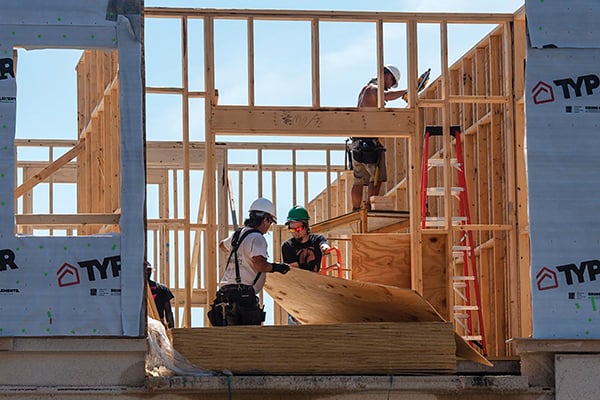By Fred Thys/VTDigger
Senators have offered a compromise to Gov. Phil Scott on a registry of home contractors — an issue that has been holding up a bill, S.226, intended to create more housing.
Scott vetoed a contractor registry earlier this year, explaining that he does not think it is needed. He has since indicated that, if the registry required contractors to register only for contracts of more than $10,000, he might agree to it.
That prompted Sen. Michael Sirotkin, D-Chittenden, chair of the Senate Economic Development, Housing and General Affairs Committee, to offer an amendment to the housing bill — require contractors to register only for contracts of more than $10,000, but establishing a position in the Attorney General’s Office that would assist with consumer complaints on home renovation contracts of less than $10,000.
The amendment would budget $200,000 for the job in the fiscal year that starts on July 1.
Otherwise, the bill:
- Eliminates requirements for developers to get both state and municipal permits to connect new homes to water and sewer services,
- Encourages land–use rules that allow denser housing,
- Encourages adding accessory dwelling units at existing homes, and
- Includes the governor’s plan to build hundreds of housing units for middle-class homeowners, including grants to builders when it costs more to build a home than it will appraise for.

Construction crews at Cottonwood Crossing in Williston in June. A bill in the state Senate contains a home contractor registry and creates a position at the Attorney General’s Office to mediate disputes between contractors and homeowners.
“We have new construction going on in Vermont,” Sirotkin explained to colleagues on the Senate floor. “As soon as that construction is done, the house assesses less than construction costs.”
The bill moved along by the Senate on Wednesday, March 30, also would provide $15 million in subsidies for middle-income homebuyers between the time it passes and June 30, 2023, something the governor has also proposed.
“Housing is the key to healthier people and healthier communities,” Senate President Pro Tem Becca Balint said in a statement. “We need to invest in it like we really mean it, and make the policy changes needed to turn the tide on the housing crisis that has been decades in the making here in Vermont. The bill we voted on today does just that.”
Lt. Gov. Molly Gray — who presides over the Senate and is running against Balint, Sen. Kesha Ram Hinsdale, D-Chittenden, and former congressional staffer Sianay Chase Clifford for the Democratic nomination to succeed Rep. Peter Welch in Congress — issued her own statement.
“We cannot decouple our housing crisis from our workforce crisis,” Gray said. “S.226 not only recognizes the crisis but works to address barriers to housing development and increase access to affordable housing.”
Ram Hinsdale, the measure’s lead sponsor, said that the bill was crafted following conversations with residents across the state. “There’s a reason we ended up with a bill that benefits renters and homeowners, workers and employers, new families and long-time residents,” she said in a statement. “You can accomplish a lot when you listen, and you don’t leave the negotiating table empty-handed.”
The bill still needs final passage from the Senate before moving to the House.
“It’s far too early to say whether he will sign the overall bill, as it still has a ways to go,” the governor’s spokesperson, Jason Maulucci, said on March 30. “However, he still believes that the controversial registry should not be attached as a negotiating tactic to the housing funding he has proposed and legislators agree with. He would prefer the Legislature move forward with the areas we all agree, and allow for negotiations on the controversial aspects separately.”
The elements in the bill that enjoy widespread support include:
- It encourages municipalities to allow at least four housing units per acre.
- In towns with populations of less than 6,000, developers would be able to build up to 50 units without having to get a permit under Act 250, the state law that controls development.
- The bill would direct $5 million in grants to improve the 40,000 mobile homes in Vermont, whether on their own sites or in mobile home parks.
- It would provide matching funds to developers to convert commercial space into residential space.
- It includes the governor’s proposal to increase tax credits to $5 million to bring older buildings in downtowns up to code for rental housing and makes projects in smaller towns eligible for the credits.
- It prohibits municipalities from requiring more than one parking space per bedroom for accessory dwelling units on a property. Vermont was the first state to allow accessory dwelling units, but has done little to encourage them compared to other states. The bill would direct $5 million for accessory dwelling units from the governor’s $20 million Vermont Housing Improvement Plan, including $1 million to help people understand how they can build additional dwelling units on their property and $4 million in financial incentives to build the units. The money could not be used to build short-term rentals. The actual $20 million for the governor’s plan is allocated under another bill, S.210, which passed the Senate last month and is now in the House.



